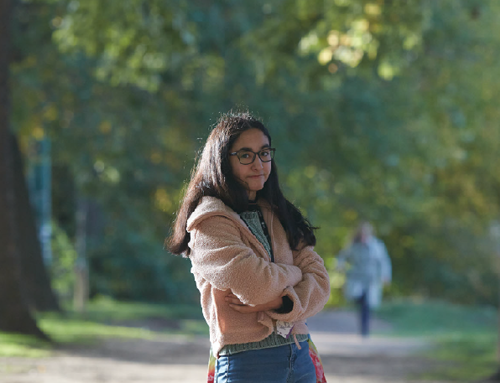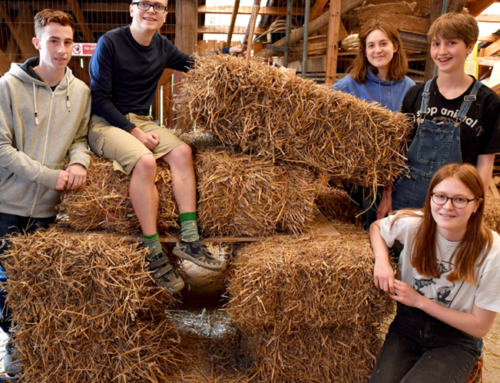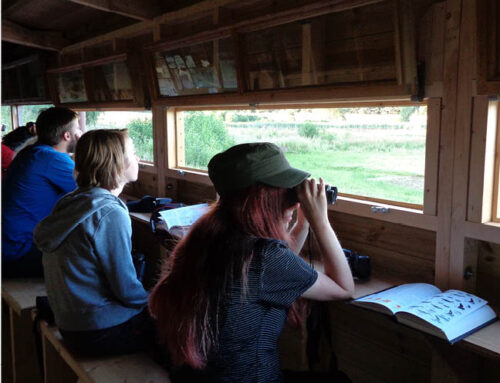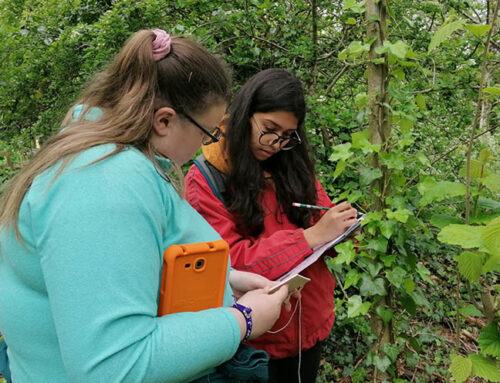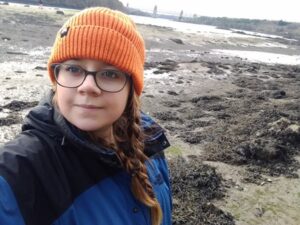
Photo: E Lowe- Emma by the Menai Strait.
This blog is written by Emma, Marine Conservation Intern. When I finished my master’s degree last September, I had no clue what the future would bring. The opportunities for entry level marine biologists are competitive in a normal world but when emerging from a lock down, the search became even more challenging. After a few months of applying for jobs across the country an amazing opportunity came up with the North Wales Wildlife Trust. Five internships had become available through the Our Wild Coast project – a project encouraging young people in North Wales to become involved in environmental work. I had my first ever interview on a Sunday afternoon, in person, and a few days later I was offered the place of Living Sea Engagement Intern.
Having studied both my undergraduate degree in Marine Biology and my postgraduate degree in marine Environmental Protection at Bangor University, I had fallen in love with the Welsh coastline. I was overjoyed at the opportunity to work in North Wales and help protect the marine environment through spreading awareness of marine issues to the public. Throughout my internship with Our Wild Coast, I was able to build upon the knowledge I had gained a university and develop new skills. From improving my marine invertebrate identification skills with Shoresearch surveys and running beach cleans to giving online talks, my 4 months with North Wales Wildlife Trust was filled with exciting new experiences.
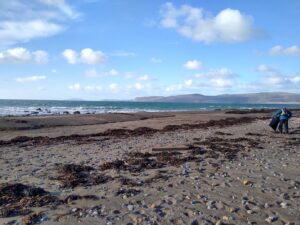
Photo: E Lowe. Beach Clean at Porth Neigwl, Day 2 of 12daysbeforethe12daysofChristmas
For the first 12 days of December the Living Seas team were running daily beach cleans with members of the public and volunteers. This series of beach cleans aimed to raise awareness of the waste produced during the festive period and was named ‘The 12 Days before the 12 Days of Christmas’. I got stuck in straight way and was out on the beach on day 2 observing how to run a beach clean in preparation for my very own.
My first event for the public was a beach clean on day 11 of the 12 Days series. The beach of choice was Porth Nobla along the east coast of Anglesey near the surfer’s destination of Rhosneigr. At first glance, the beach appeared to be clean, but as we walked along it became clear we would easily fill up our bags. From nurdles and cotton bud sticks to sofa cushions, litter was abundant.
Unfortunately, going into the new year we were hit with another lock down. Whilst this brought difficulties it also gave way to new opportunities and experiences. Being unable to carry out in- person events, we moved our engagement activities online. With the power of zoom and Facebook livestreaming we managed to adapt to this new working environment.
In February, the Living Seas team hosted an online festival of the sea, ‘Shore-nanigans.’ This was a weekend of online activities including talks and music. I gave my very first zoom talk on marine invasive species to an audience of around 60 people from across the UK. Presenting virtually was a completely different experience compared with giving talks in person and while it was nerve wracking it was also incredibly exciting being able to inform so many people about the issue of marine invasive species.
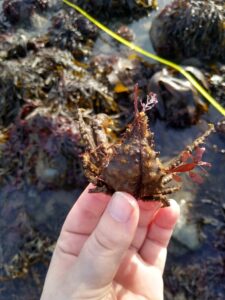
Photo: E Lowe. Toad Crab at Criccieth, found during a Shoresearch survey
As well as carrying out engagement activities, my internship gave me the opportunity to run my own project. After being contacted by a volunteer asking about the presence of the Montagu’s Crab in North Wales, I developed a citizen science survey to monitor the species of crabs- Crabtastic. The aim of Crabtastic was to get an idea of where different species of crabs are found along the North Wales coastline. The Montagu’s crab is a climate change indicator, and its distribution is thought to be increasing northwards as water temperatures increase. As well as developing a survey, I also provided training sessions to volunteers for the methodology and crab identification.
My internship allowed me to explore the coastline I love so much and continue to develop my marine biology skills. Since finishing in March, I have been able to stay within the Wildlife Trust movement as the Conservation Intern with The Wildlife Trusts allowing me to continue to support marine conservation work around the country. The skills and experiences I gained through my internship with Our Wild Coast has helped me get my foot in the door for marine conservation work and I am excited to see what the future bring.
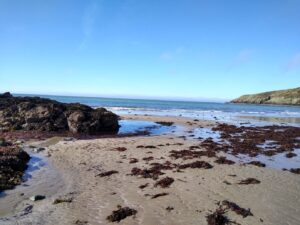
Photo: E Lowe- Porth Swtan (Church Bay), Anglesey. Where I tested out the crabtastic methodologies.

